

We may earn revenue from the products available on this page and participate in affiliate programs. Learn More ›
Electricity is essential for operating lights, appliances, and important home systems, like the air conditioner and furnace, as well as charging personal devices, like a tablet or smartphone. So before the electricity goes out, make sure you select a backup generator that can keep your home powered during an outage until the electricity can be restored.
Different types of generators can be used for varying purposes, such as powering a campsite or simply recharging mobile devices while you are on the road. Depending on your needs, you can use a propane generator, hydrogen generator, natural gas generator, or even a solar generator. Use this guide to discover more about 11 types of generators so you can find the right generator to power your home, RV, or campsite.
1. Portable Generators
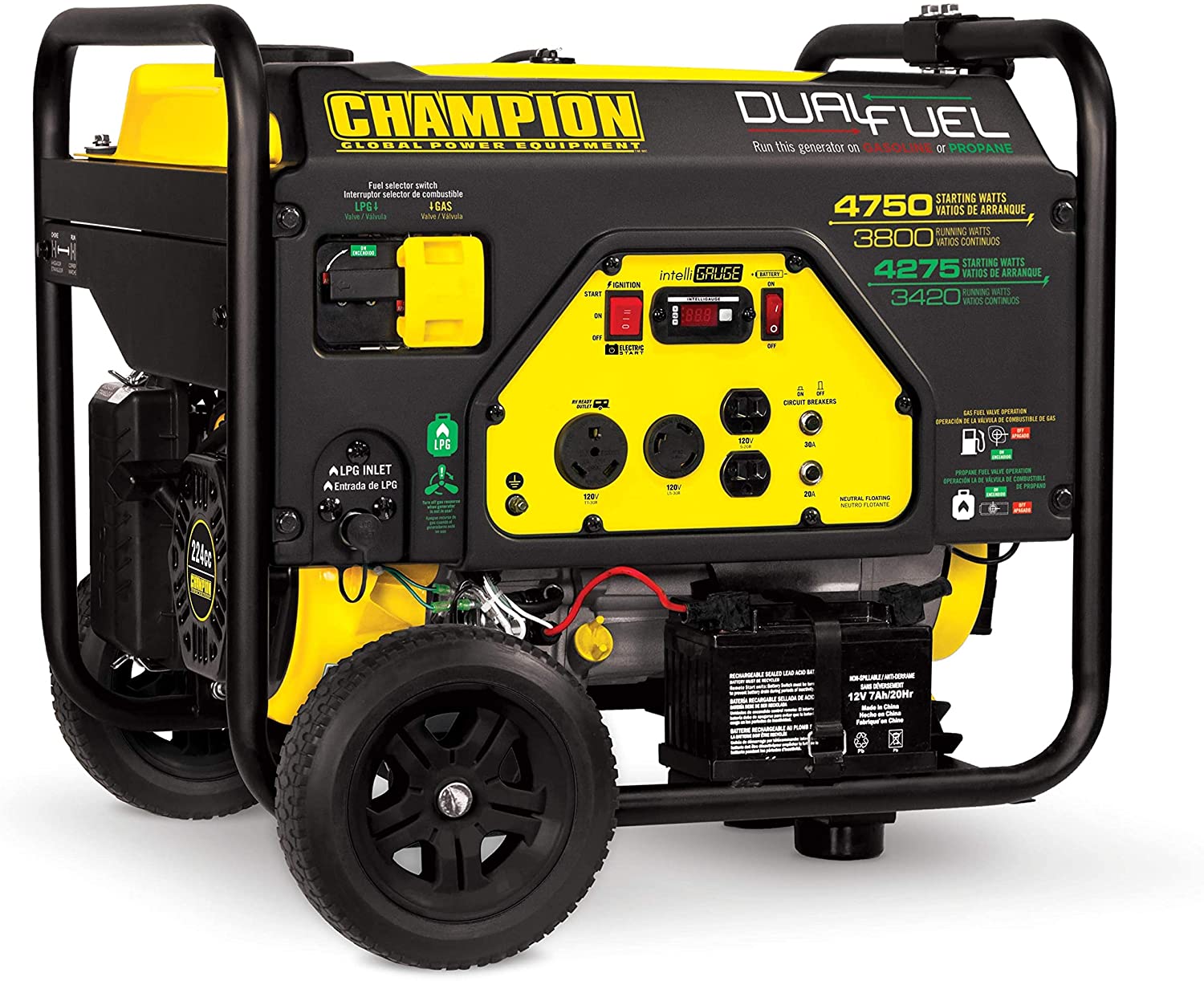
Small, compact, and easy to carry or cart around, a portable generator is typically fueled by gasoline, propane, or solar energy because these fuel sources are readily available. Gas and propane can both be sourced from a gas station, while solar energy comes directly from the sun. Their small size means that these generators are easy to store in a vehicle or convenient to keep in a shed or garage until they are needed.
On camping trips, a portable generator can recharge mobile devices, run the camp hot plate, or keep the lights on after the sun goes down. However, these generators sacrifice power production for mobility, so when it comes to a portable vs. standby generator, portable generators aren’t able to produce the same amount of energy as larger standby generators, but their reduced size and capacity means that they come at a more affordable price.
Best for: Camping or keeping in the car for emergencies
Editors’ Choice: The Champion Power Equipment portable generator is a dual-fuel machine that runs on either gas or propane, and is equipped with a set of wheels for easy maneuverability.
2. Inverter Generators
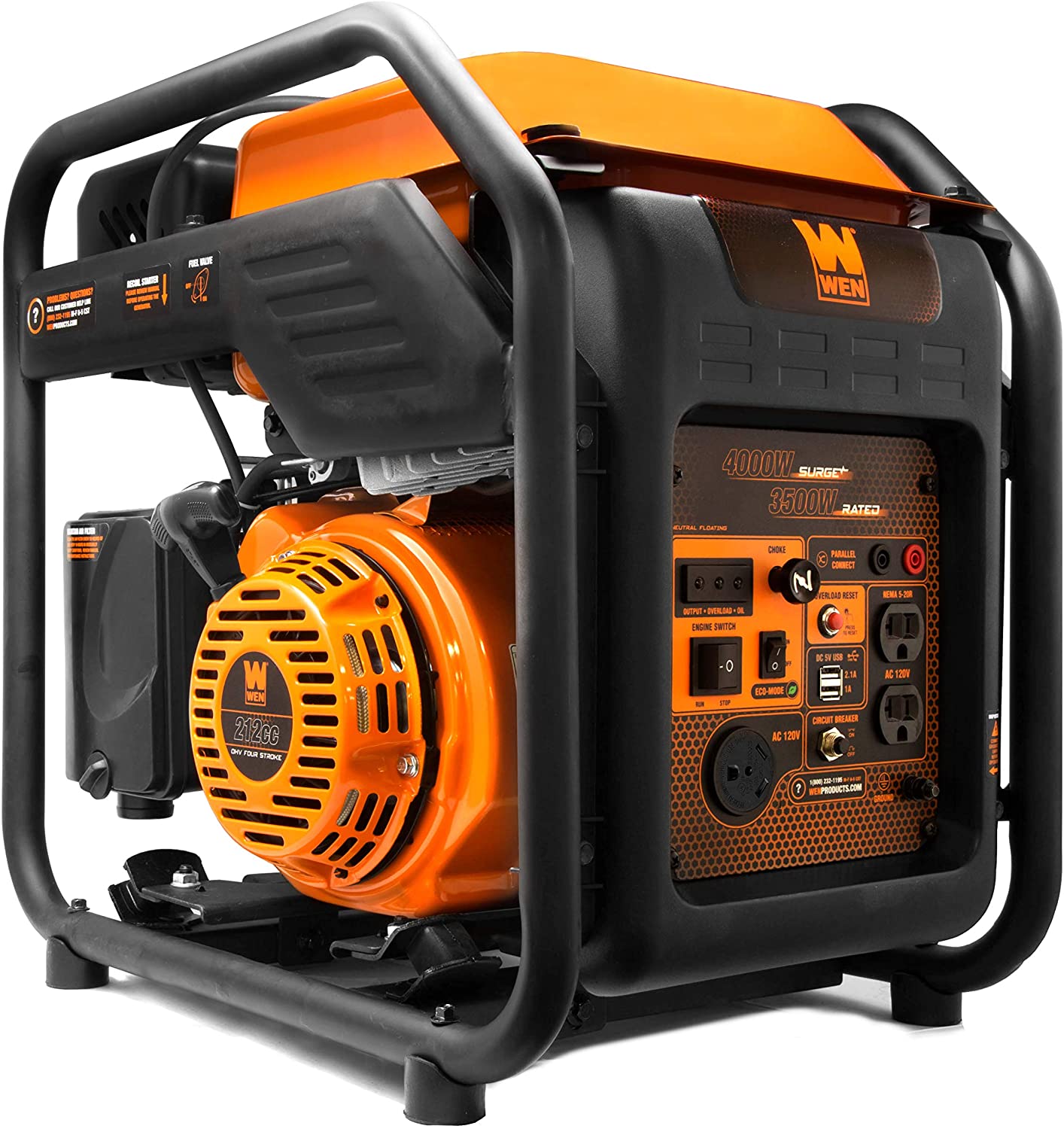
Inverter generators can be home generators or portable generators, but they differ in the way that they produce electricity. A standard generator produces electricity in a single-phase and can’t keep the flow of electricity steady, while an inverter generator produces electricity in three phases, creating a high-frequency alternating current (AC), which is then inverted to a direct current (DC), and finally inverted once more to a stable AC output.
This process seems complex, but it actually helps create what’s known as clean energy, or energy that remains stable while in use. For this reason, it’s suitable for use with sensitive electronics, like phones and laptops. Due to the stable energy output, inverter generators also operate more quietly.
Best for: Protecting electronic equipment from power surges
Editors’ Choice: This WEN GN400i inverter generator provides clean energy and is free of voltage spikes, making it safe for use with laptops, smartphones, and other sensitive electronic devices.
3. Standby Generators
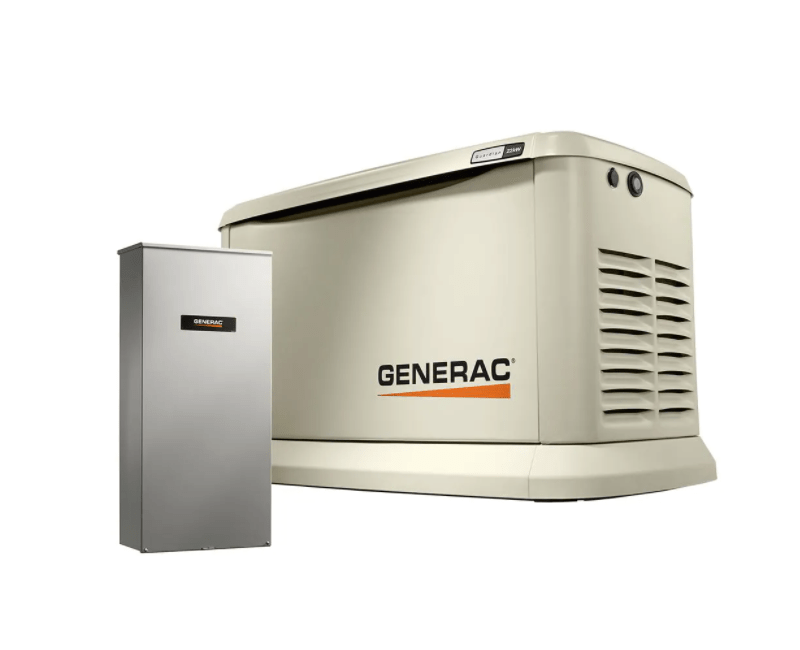
A standby generator’s high price tag puts it into an entirely different category than portable generators. While a small, portable product can be picked up, carried, or packed into a vehicle, a standby generator is a semi-permanent feature of the home—it actually takes up more space than a standard air-conditioning unit. These generators have a large fuel tank and an industrial generator-grade engine with high fuel efficiency, which allow them to provide power to the whole home in emergency situations.
Great for powering small cabins or backup emergency systems, standby generators are sometimes outfitted with Wi-Fi connectivity that allows the user to monitor the generator’s status via a mobile app. Aside from cost, the main disadvantage of a standby generator is that they require regular maintenance to make sure that they are operational in case of a blackout.
Best for: Turning on automatically in response to a power outage, and providing a home with uninterrupted power
Editors’ Choice: The Generac 7043 standby generator features Wi-Fi connectivity, and allows users to monitor the status of the generator from anywhere via the mobile app.
4. Gasoline Generators
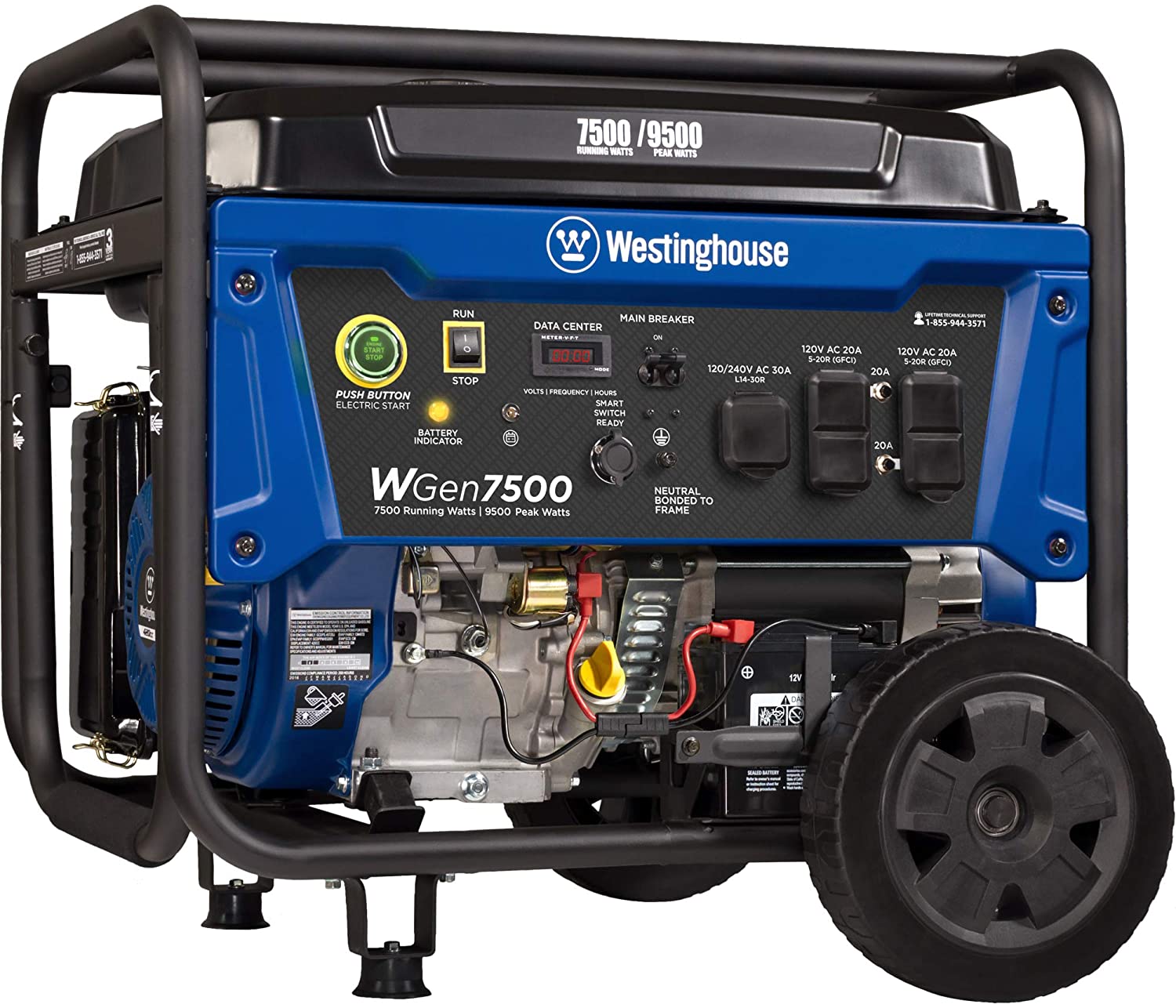
Generators can run on a variety of different fuels, but the most common fuel for portable and inverter generators is gasoline. Any generator that operates on gasoline falls into this category, which makes broad observations difficult. The power, features, and suitable uses of a lightweight, portable generator that runs on gas and those of a gas-fueled, inverter generator are different.
Typically, a gas generator has relatively straightforward controls and low prices, which makes them good picks for inexperienced operators and shoppers on a limited budget. On the downside, this kind of generator has high emission rates, and runs on a fuel that is more expensive over the long run than propane, diesel, or natural gas, so it may be worth looking for a dual fuel generator that uses both gas and a secondary fuel source.
Best for: Shoppers who are on a budget, or use their generators infrequently
Editors’ Choice: Fuel the campsite with this Westinghouse WGen12500 gasoline generator, which runs for up to 12 hours on a 6.6-gallon tank of gasoline.
5. Diesel Generators
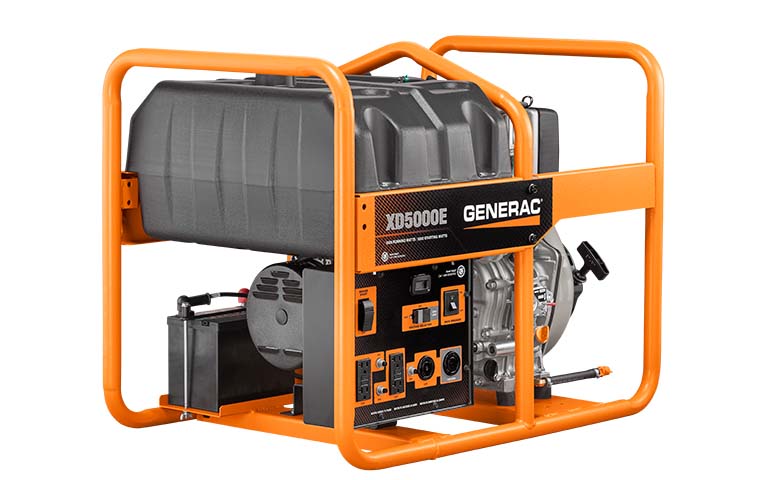
Diesel generators, as their name indicates, are fueled by diesel instead of gasoline. Most products in this category are standby generators, though there are some inverter and portable diesel generators out there. Generators that run on diesel can provide a more efficient power output than gasoline standby generators. There are cost benefits to buying a diesel generator too: Because diesel generators are more fuel efficient than gasoline-powered models, you’ll spend less on fuel over time.
These generators can work well in freezing temperatures if they are filled with winter diesel fuel. Regular diesel fuel can freeze and gel, preventing the generator from starting. Diesel’s low burning temperature puts less strain on an electric engine than gasoline or propane, allowing diesel generators to have a higher level of durability and longer life. However, keep in mind that diesel generators produce harmful emissions that can be toxic if inhaled.
Best for: Those who are looking for long-lasting, easy-to-maintain generators; those who need a generator for industrial use or as a whole-house standby
Editors’ Choice: Run the campsite for up to 32 hours on a 12-gallon tank of diesel fuel with Generac’s XD5000E diesel generator.
6. Natural Gas Generators
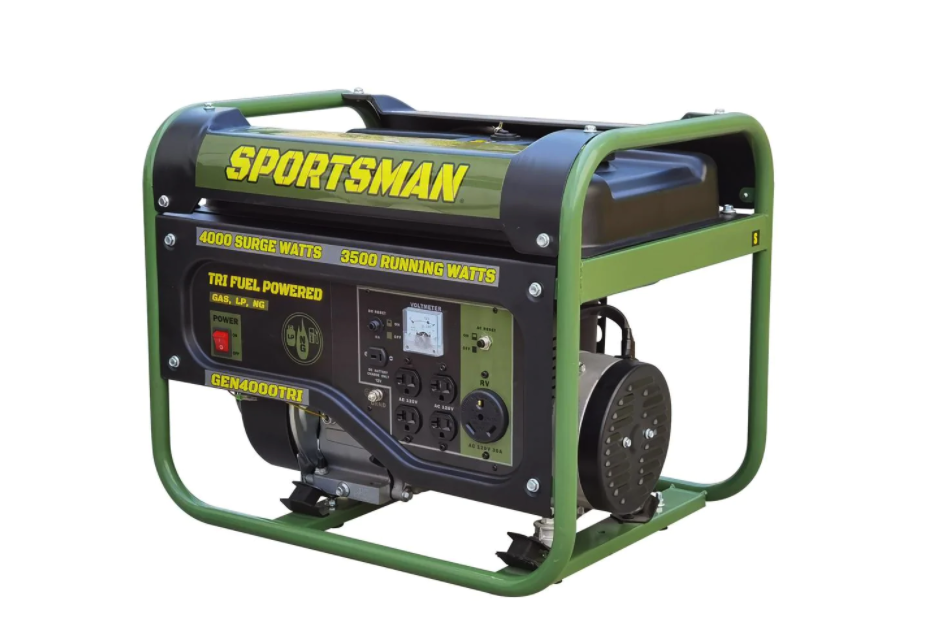
Generators that run on natural gas tend to fall into the standby generator category, though there are some portable generators that also run on natural gas. Compared to diesel generators, natural gas generators produce a significantly lower rate of emissions, making them a great choice for whole-home backup power. Once they are installed, it’s relatively easy to learn how to use these generators.
Natural gas generators are durable and can last for years with regular maintenance. However, the initial cost of installing these systems is relatively high. Another downside to natural gas generators is that they can be vulnerable to extremely cold climates, so they may not be the best option for residents of Alaska or the northern states bordering Canada.
Best for: Eco-friendly shoppers who are concerned about pollutant emissions levels; whole-house standby generators
Editors’ Choice: The portable Westinghouse 13,000/10,500 generator runs on gasoline, propane, or natural gas and it can be used for a tailgate party, at the campsite, or as a backup for a home electrical system.
7. Solar Generators
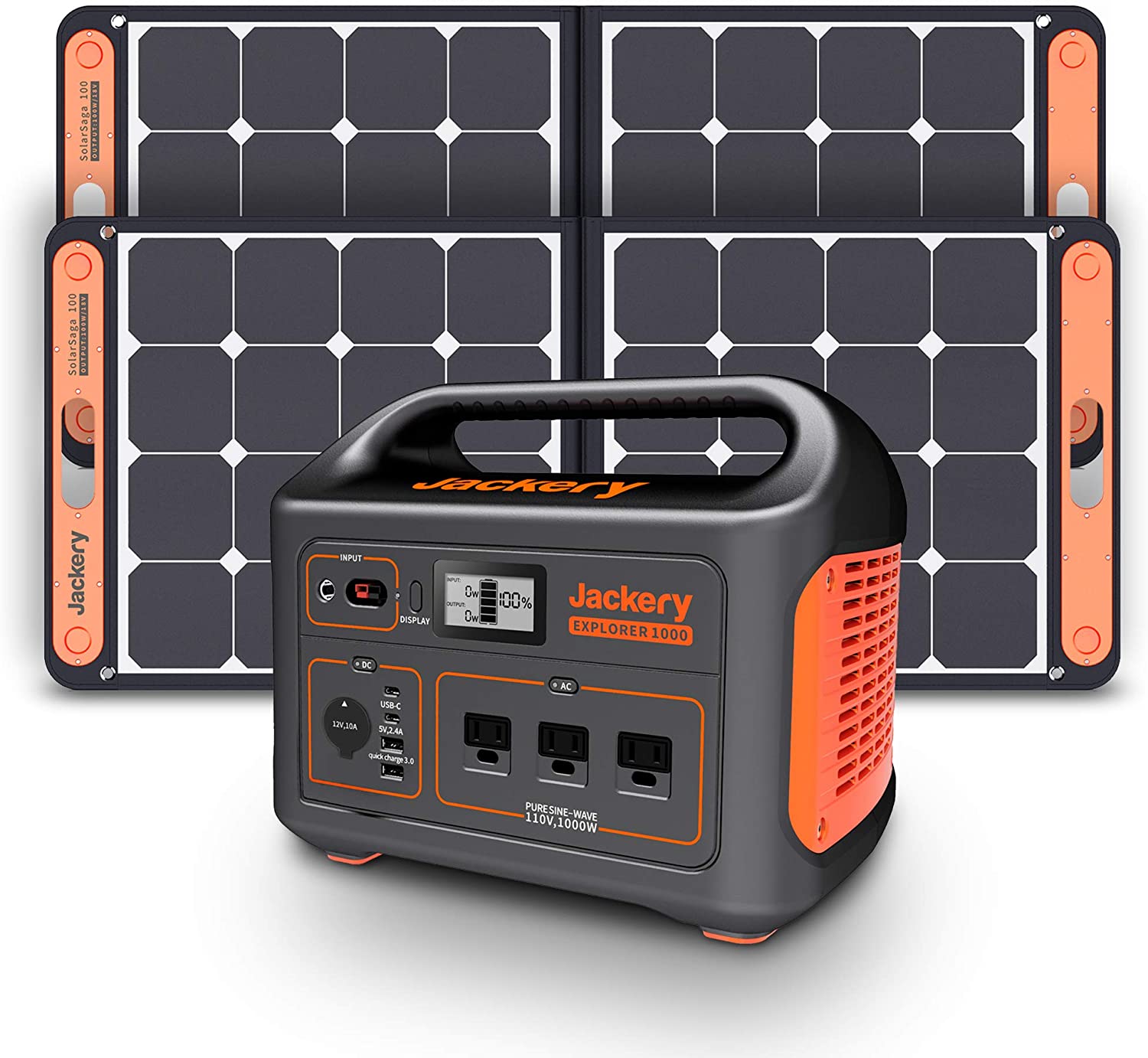
Portable solar generators are ideal for camping or keeping in the car as an emergency source of electricity, because the fuel is renewable and free. However, whole-home solar generators can be expensive to set-up since they require professional installation.
Solar generators are typically made with built-in solar panels, but some come with detachable solar panels that can be set up or angled to better absorb the sun’s rays. The disadvantages of these generators is that they don’t work when it’s dark outside, and they don’t produce a whole lot of power so a battery is necessary for reliable power.
Best for: Eco-conscious shoppers who can afford upfront costs of whole-home solar generators; portable generator users who don’t need a lot of backup power
Editors’ Choice: The portable Jackery 1000 solar generator comes with two large solar panels that produce green electricity for powering electric grills and coffee makers, and for charging tablets, phones, and other mobile devices.
8. Hydrogen Generators
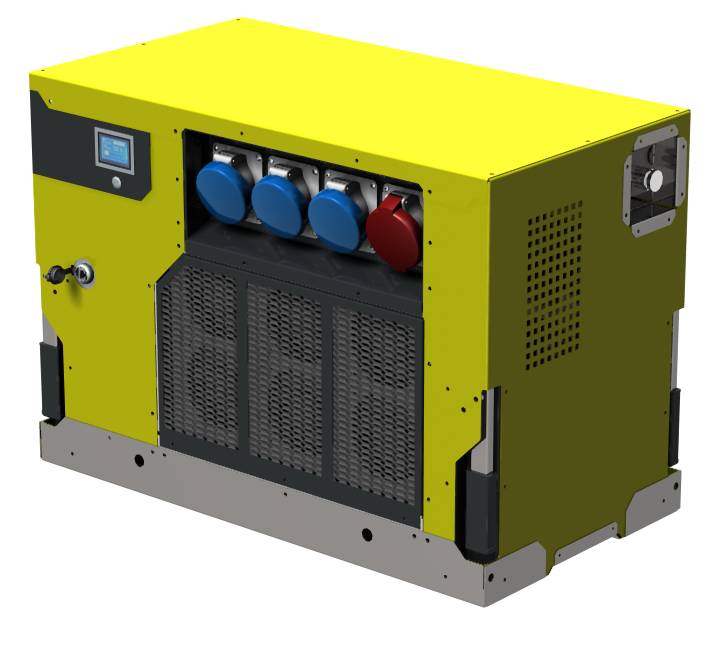
Relatively new to the market, hydrogen generators are not easy to find. These machines are fueled by hydrogen gas and are designed with internal fuel cells to help manage the system’s fuel efficiency. Some of the advantages of purchasing a hydrogen generator are that they produce a higher power output than other generators, they’re sturdy and pretty resistant to impact damage, as well as being one of the quietest generator types available.
On the downside, because there are so few hydrogen generators on the market, they aren’t cheap—and it may take some searching to find a product that meets your particular needs. These devices are efficient and durable enough to make them worth seeking out, though, it’s important to consider how big of a generator you need before investing in one of these products. In the near future, the industry may see more and more companies producing hydrogen generators.
Best for: Homes or businesses that require an uninterrupted power supply (for security or health applications, for example); remote areas; indoor use
Editors’ Choice: The H2Sys hydrogen generators can be used as a backup generator for the home with an integrated hydrogen tank and fuel cell system for high efficiency.
9. Propane Generators
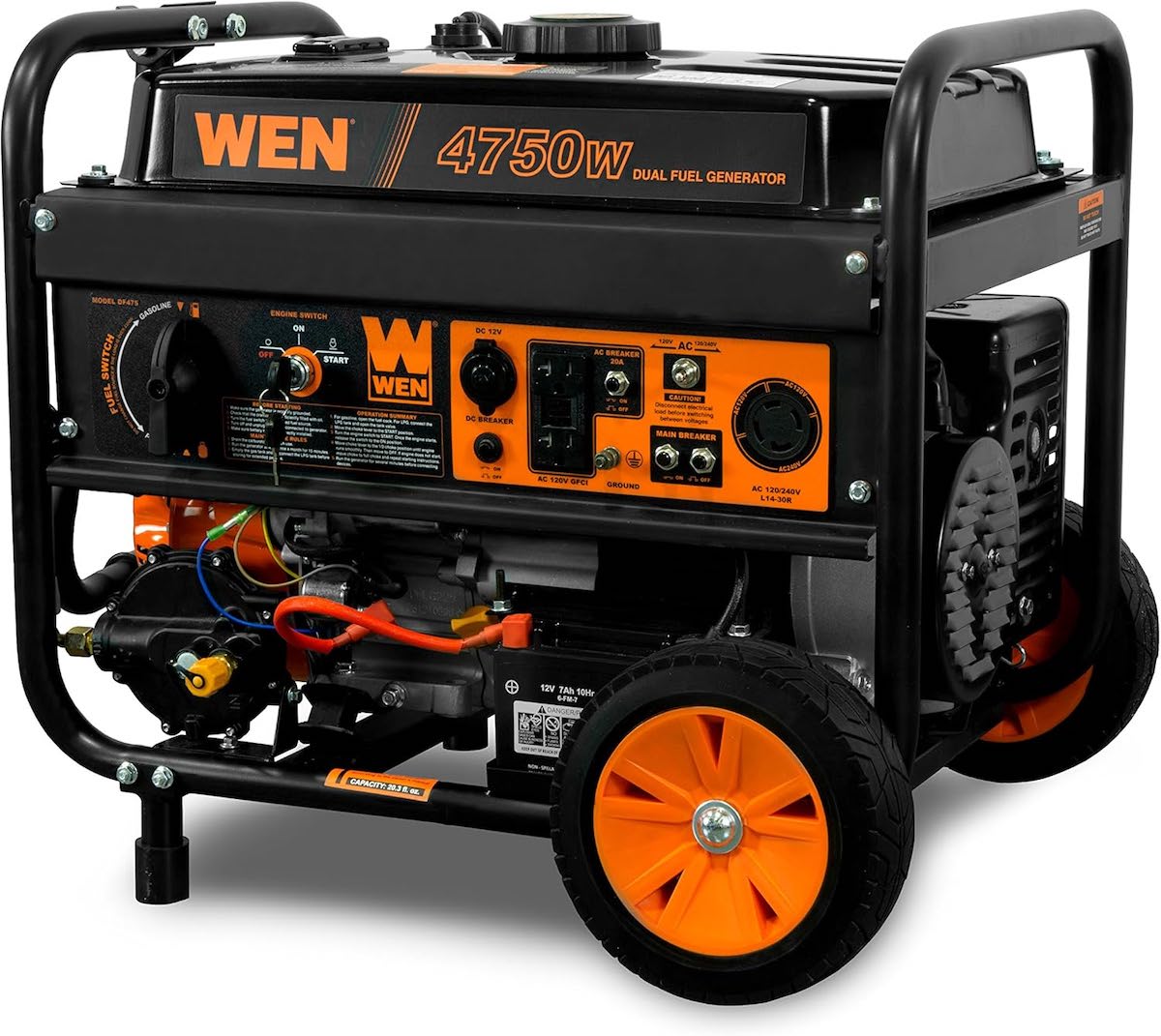
One of the most common generators available for home use are propane generators. They have a similar design to gas or diesel generators, but use propane as a fuel source. Propane is relatively easy to find and store, so you can keep a supply available in a nearby shed for use during emergencies.
Propane is also effective in cold temperatures, making this type of a generator an excellent choice for homes located in colder climates. Though, it should be mentioned that propane typically costs more than natural gas and it tends to burn faster than diesel fuel, making these generators a more costly option for the home.
Best For: Camping, road trips, and emergency backup power for the home; propane generators are an effective and readily available option that can be found online or at a home improvement store
Editors’ Choice: Users can switch between gasoline and propane with the WEN DF475T dual fuel generator, which comes with an easy-to-use electric start and a set of wheels to help improve portability.
10. Biodiesel Generators
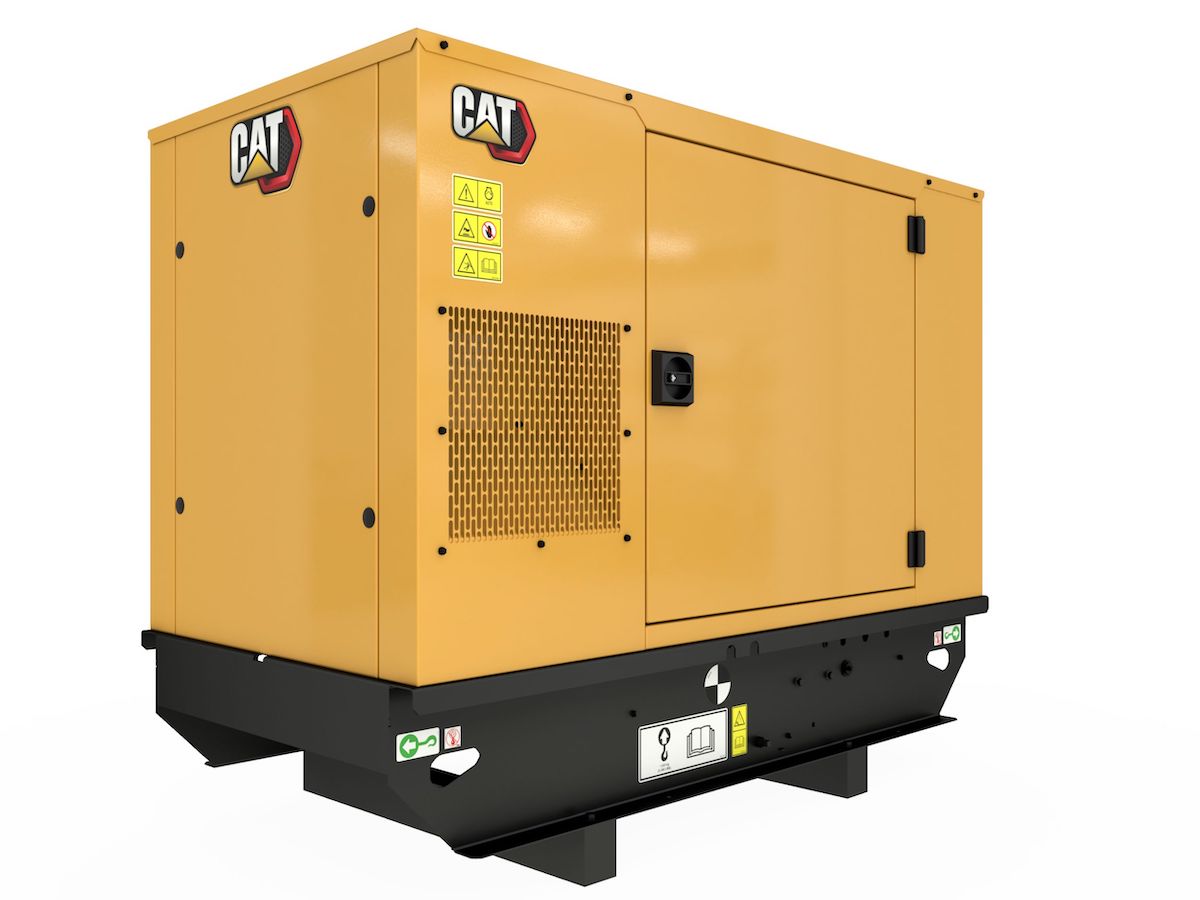
One of the major drawbacks of a diesel generator is the harmful exhaust it produces, but a biodiesel generator is a more eco option for those that want the energy efficiency of a diesel generator while taking a conscientious approach to emissions. This type of generator uses a mixture of diesel and environmentally-friendly components, such as vegetable oil and animal fat.
By relying on this mix of fuels, biodiesel generators reduce the use of nonrenewable fuel sources and help to lower emissions. However, while biodiesel generators are effective for short periods of time, they can become unreliable during extended power outages if you aren’t near a biodiesel fueling center.
Best For: Environmentally-friendly backup power for a home, campsite, workshop, or trailer.
Editors’ Choice: CAT diesel generators are designed to work with biodiesel fuel, making this C1.1 diesel generator a good choice to reduce harmful emissions while providing emergency backup power to the home.
11. Induction Generators
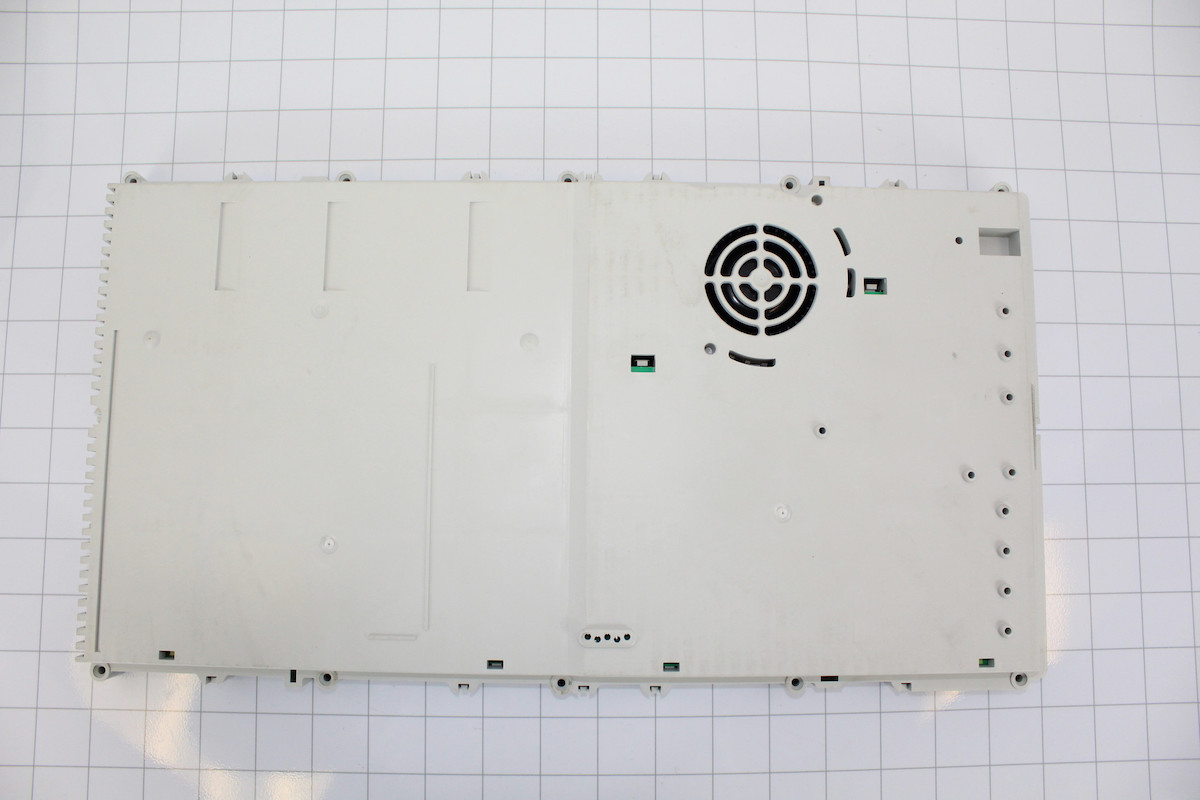
Learning how a generator works can be complicated depending on the type of generator, but it’s often worth having at least a rudimentary understanding to make it easier to choose the right generator for your home. An induction generator creates electromagnetic fields, enabling it to turn an internal rotor at varying speeds to generate energy.
However, these machines typically require a significant amount of mechanical energy to start this process, which is why they are most commonly used in wind turbines and mini hydro plants. The small size of induction generators make them easy for professionals to maintain, but since they produce power at varying speeds and unstable wattage outputs, these generators are generally not a good choice for home use.
Best For: Specific uses, like powering an induction cooktop or generating power from mechanical energy sources, such as a wind turbine.
Editors’ Choice: Intended for use in Dacor Cooktops, this Dacor 107517 induction generator can be installed by a trained technician or an experienced DIYer for stovetop induction cooking.
FAQs
Gas generators are the most common option available. Among gas-using generators, the top three most popular types are portable, inverter, and standby generators. Typically, when a homeowner is purchasing a generator for the home, campsite, or for a road trip, they will invest in one of these three types of generators.
Standby or whole-house generators are used to power a house. Depending on the model, they may use natural gas, diesel, propane, or gasoline. In some cases, whole-house generators may also use solar energy, though solar can be unreliable without a battery.
Inverter generators are typically the most efficient choice available, though the level of energy efficiency depends on the type of fuel. Diesel fuel tends to be more efficient than gasoline, propane, and natural gas, but diesel also produces more harmful emissions.
